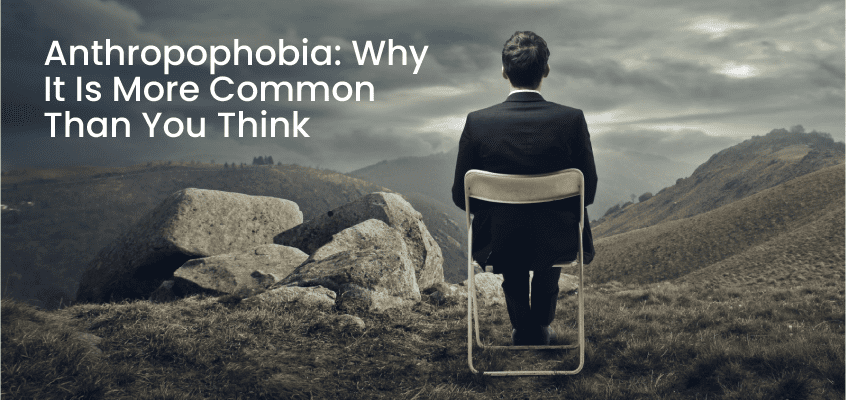Introduction
Fear of people is an interesting phenomenon; it’s more common in some societies than others, yet we don’t discuss it. We’re more likely to talk about the fear of failure (Atychiphobia) or sharks (galeophobia) or spiders (arachnophobia), even though we’re more likely to hurt ourselves from falling off a chair than from a shark or spider attack. The symptoms of Anthropophobia are usually unnecessarily distressing and focus on social interaction and performance. Individuals often fear that others will judge them harshly and criticise them. This blog looks into the causes of Anthropophobia and ways around these fears.
What is Anthropophobia?
Anthropophobia, according to psychiatrists, is a fear of people or society rather than a mental or clinical condition. People with Anthropophobia may avoid crowds, be afraid of maintaining eye contact or face-to-face interactions or be overly concerned about being judged.[1][3]
Anthropophobia is not a real threat to the person; it is a worry they have. People cannot regulate this fear or anxiety, which leads to many scary thoughts. The condition is highly prevalent among adolescents, teenagers, and women.
The National Institute of Mental Health defines Anthropophobia as a “social anxiety condition”, and researchers believe it is ‘sociophobia’, or the fear of social gatherings.
In severe cases, Anthropophobia can cause a person to drop out of school, college, or employment and shun social events. It will prevent individuals from fulfilling their basic human urge to engage with others.
Symptoms of Anthropophobia
Anthropophobia may affect a person in various ways that are difficult to comprehend. Even doctors could be unaware of the early indications of the condition. Initially, it may manifest as an overwhelming dread of making direct eye contact and concern that others are monitoring them.[2]
‘Anticipatory anxiety, which refers to how a person feels agitated and nervous on social occasions, is an obvious indication of Anthropophobia. The individual may experience sleep issues, digestive problems, panic attacks, and headaches as part of the condition. Here are some of the symptoms of Anthropophobia:
-
Depression
-
Finding it hard to breathe, speak, or make decisions
-
Having the feeling that something terrible is about to happen
-
Fearfulness or anxiety about offending others
-
Significant levels of awareness regarding social interactions
-
Feeling unworthy or inadequate in front of others
-
Negative thoughts or self-talk
-
Difficulty speaking with people
-
Sweating and shaking
-
Wanting to run away
-
My heart is beating too fast.
Causes of Anthropophobia
If we get to the bottom of any phobia, we see they are all tied to some tragedy in the person’s past. Here are some of the causes of Anthropophobia:
Betrayal by a loved one
A betrayal can trigger Anthropophobia by a family member or friend. If the individual feels another has deceived them, they may strive to avoid social engagements.
Hormonal imbalances
Hormones from the adrenal glands help in managing stress. If the adrenal glands are not functioning correctly, this could lead to the development of Anthropophobia.
Family history
A person with a family history of anxiety disorders is likelier to develop a phobia.
Other health concerns
Thyroid or heart problems may be a symptom of Anthropophobia.
Effects of Anthropophobia
Besides the typical symptoms, Anthropophobia may significantly impact the person with it and others around them. People with Anthropophobia will miss many opportunities since they try to avoid social interactions out of their excessive fear of people. They won’t be able to communicate with anyone on a personal level and will be unable to make any real friends. The individual will find it intimidating to initiate conversations with anyone or establish eye contact with strangers. As a result, people often ignore anthropophilic individuals in social situations and isolate them from group conversations.
Treatment of Anthropophobia
Mental health professionals frequently worry that Anthropophobia and other anxiety disorders may cause individuals to turn to alcohol and substance abuse for relief from their symptoms. Unfortunately, this typically makes matters worse.[4]
Many therapeutic choices are available for Anthropophobia, but it is essential to identify this phobia as soon as possible to stop its progression. Therapy sessions aimed at transforming negative ideas into positive ones might be necessary. A therapist will guide you in this journey to identify the roots of your fears and build emotional resilience against your internal conflicts.
If your symptoms are severe, the doctor could prescribe certain medications to treat them. Some studies have also suggested that meditation and mindfulness can help individuals to overcome their Anthropophobia.
Forming and being a part of Support groups to be able to talk and gradually overcome the phobia
Want to learn how practising mindfulness and meditation can help you manage your anxiety and eliminate your irrational fears? Click here to begin the beautiful journey of mindfulness and meditation.
Conclusion
Even though we live in the 21st century, distrust and prejudices toward mental health and therapy continue to exist. People sometimes have to suffer silently with their anxieties out of fear of rejection by the formidable wall society has built around mental health.
The third-most common phobia, fear of people, is called Anthropophobia and affects about 10% of the population. You never know; the person beside you may silently have this phobia. It is time we challenge social prejudices and seek guidance for our internal phobias and anxieties. The first step to do so is by accepting our fears and analysing the cause behind them.
References
[1] “Anthropophobia (fear of people),” Cleveland Clinic. [Online]. Available: https://my.clevelandclinic.org/health/diseases/21948-anthropophobia-fear-of-people. [Accessed: 28-Mar-2023].
[2] J. Herndon, MS, MPH, and MFA, “Anthropophobia (anthropophobia): Test, treatment, and more,” Healthline, 02-Apr-2018. [Online]. Available: https://www.healthline.com/health/anthropophobia. [Accessed: 28-Mar-2023].
[3] L. Fritscher, “Understanding the fear of people (anthropophobia),” Verywell Mind, 30-Jan-2013. [Online]. Available: https://www.verywellmind.com/anthropophobia-2671732. [Accessed: 28-Mar-2023].
[4] A. Doctors, “Anthropophobia : Causes, symptoms, treatment and prevention,” Apollo Hospitals Blog, 09-Sep-2022. [Online]. Available: https://healthlibrary.askapollo.com/anthropophobia-causes-symptoms-treatment-and-prevention/. [Accessed: 28-Mar-2023]









